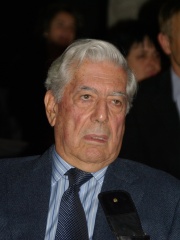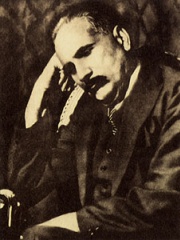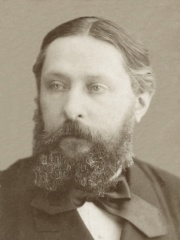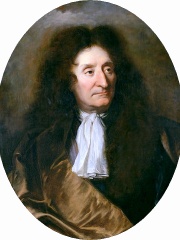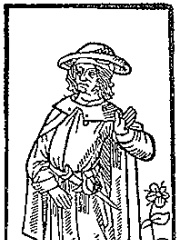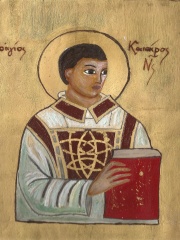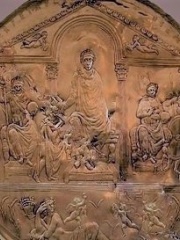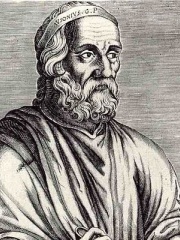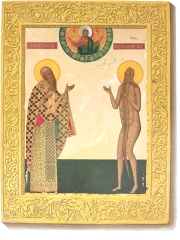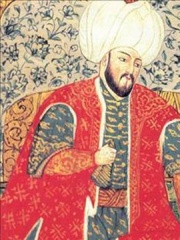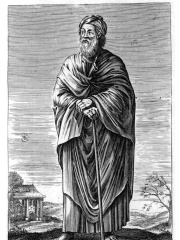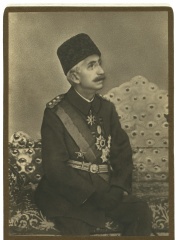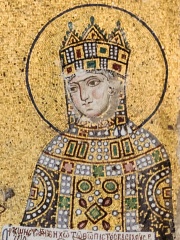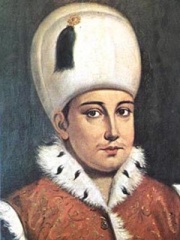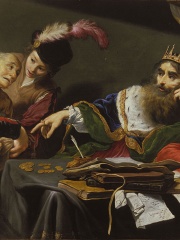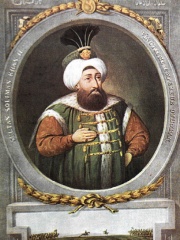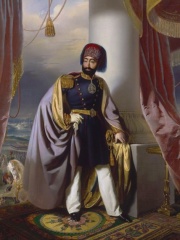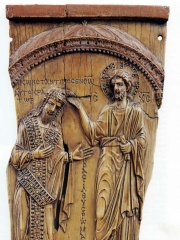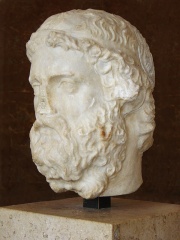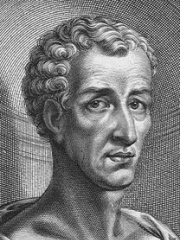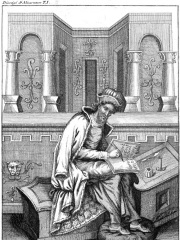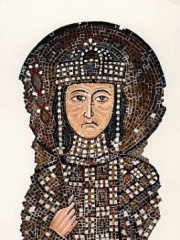WRITER
Ammianus Marcellinus
330 - 395

 Ammianus Marcellinus
Ammianus Marcellinus
Ammianus Marcellinus, occasionally anglicized as Ammian (Greek: Αμμιανός Μαρκελλίνος; born c. 330, died c. 391 – 400), was a Greek and Roman soldier and historian who wrote the penultimate major historical account surviving from antiquity (preceding Procopius). Written in Latin and known as the Res gestae, his work chronicled the history of Rome from the accession of Emperor Nerva in 96 to the death of Valens at the Battle of Adrianople in 378. Only the sections covering the period 353 to 378 survive. Read more on Wikipedia
His biography is available in 62 different languages on Wikipedia (up from 61 in 2024). Ammianus Marcellinus is the 127th most popular writer (up from 447th in 2024), the 54th most popular biography from Türkiye (up from 200th in 2019) and the 2nd most popular Turkish Writer.
Ammianus Marcellinus was a fourth-century Roman historian who wrote a history of Rome from the death of Augustus in 14 AD to the death of Valens in 378 AD.
Memorability Metrics
Page views of Ammianus Marcellinus by language
Among WRITERS
Among writers, Ammianus Marcellinus ranks 127 out of 7,302. Before him are Mario Vargas Llosa, Federico García Lorca, Muhammad Iqbal, Ivo Andrić, Naguib Mahfouz, and Jane Austen. After him are Apuleius, Sully Prudhomme, Jean de La Fontaine, Ezra Pound, François Villon, and Günter Grass.
Most Popular Writers in Wikipedia
Go to all RankingsMario Vargas Llosa
1936 - 2025
HPI: 80.93
Rank: 121
Federico García Lorca
1898 - 1936
HPI: 80.92
Rank: 122
Muhammad Iqbal
1877 - 1938
HPI: 80.65
Rank: 123
Ivo Andrić
1892 - 1975
HPI: 80.64
Rank: 124
Naguib Mahfouz
1911 - 2006
HPI: 80.63
Rank: 125
Jane Austen
1775 - 1817
HPI: 80.62
Rank: 126
Ammianus Marcellinus
330 - 395
HPI: 80.61
Rank: 127
Apuleius
125 - 170
HPI: 80.60
Rank: 128
Sully Prudhomme
1839 - 1907
HPI: 80.51
Rank: 129
Jean de La Fontaine
1621 - 1695
HPI: 80.50
Rank: 130
Ezra Pound
1885 - 1972
HPI: 80.47
Rank: 131
François Villon
1431 - 1463
HPI: 80.47
Rank: 132
Günter Grass
1927 - 2015
HPI: 80.42
Rank: 133
Contemporaries
Among people born in 330, Ammianus Marcellinus ranks 1. After him is Caesarius of Nazianzus. Among people deceased in 395, Ammianus Marcellinus ranks 2. Before him is Theodosius I. After him are Gregory of Nyssa, Ausonius, Rufinus, and Macarius of Alexandria.
Others Born in 330
Go to all RankingsAmmianus Marcellinus
WRITER
330 - 395
HPI: 80.61
Rank: 1
Caesarius of Nazianzus
PHYSICIAN
330 - 368
HPI: 63.29
Rank: 2
Others Deceased in 395
Go to all RankingsTheodosius I
POLITICIAN
340 - 395
HPI: 83.74
Rank: 1
Ammianus Marcellinus
WRITER
330 - 395
HPI: 80.61
Rank: 2
Gregory of Nyssa
RELIGIOUS FIGURE
335 - 395
HPI: 75.72
Rank: 3
Ausonius
WRITER
310 - 395
HPI: 71.64
Rank: 4
Rufinus
POLITICIAN
335 - 395
HPI: 63.38
Rank: 5
Macarius of Alexandria
RELIGIOUS FIGURE
297 - 395
HPI: 62.79
Rank: 6
In Türkiye
Among people born in Türkiye, Ammianus Marcellinus ranks 54 out of 1,347. Before him are John Chrysostom (349), Alp Arslan (1029), Şehzade Mustafa (1515), Xenophanes (-570), Mehmed VI (1861), and Zoë Porphyrogenita (978). After him are Leucippus (-500), Osman II (1604), Gregory of Nazianzus (329), Croesus (-596), Suleiman II (1642), and Mahmud II (1785).
Others born in Türkiye
Go to all RankingsJohn Chrysostom
RELIGIOUS FIGURE
349 - 407
HPI: 81.25
Rank: 48
Alp Arslan
POLITICIAN
1029 - 1072
HPI: 81.18
Rank: 49
Şehzade Mustafa
POLITICIAN
1515 - 1553
HPI: 80.98
Rank: 50
Xenophanes
PHILOSOPHER
570 BC - 475 BC
HPI: 80.90
Rank: 51
Mehmed VI
POLITICIAN
1861 - 1926
HPI: 80.90
Rank: 52
Zoë Porphyrogenita
POLITICIAN
978 - 1050
HPI: 80.62
Rank: 53
Ammianus Marcellinus
WRITER
330 - 395
HPI: 80.61
Rank: 54
Leucippus
PHILOSOPHER
500 BC - 500 BC
HPI: 80.59
Rank: 55
Osman II
POLITICIAN
1604 - 1622
HPI: 80.52
Rank: 56
Gregory of Nazianzus
PHILOSOPHER
329 - 389
HPI: 80.37
Rank: 57
Croesus
POLITICIAN
596 BC - 546 BC
HPI: 79.99
Rank: 58
Suleiman II
POLITICIAN
1642 - 1691
HPI: 79.89
Rank: 59
Mahmud II
POLITICIAN
1785 - 1839
HPI: 79.86
Rank: 60
Among WRITERS In Türkiye
Among writers born in Türkiye, Ammianus Marcellinus ranks 2. Before him are Hesiod (-800). After him are Orhan Pamuk (1952), Constantine VII (905), Anacreon (-570), Lucian (120), Dionysius of Halicarnassus (-60), Anna Komnene (1083), Giorgos Seferis (1900), Zosimus (460), Novatian (220), and Yunus Emre (1240).
Hesiod
800 BC - 700 BC
HPI: 86.72
Rank: 1
Ammianus Marcellinus
330 - 395
HPI: 80.61
Rank: 2
Orhan Pamuk
1952 - Present
HPI: 78.34
Rank: 3
Constantine VII
905 - 959
HPI: 77.72
Rank: 4
Anacreon
570 BC - 485 BC
HPI: 77.55
Rank: 5
Lucian
120 - 200
HPI: 77.17
Rank: 6
Dionysius of Halicarnassus
60 BC - 7 BC
HPI: 76.82
Rank: 7
Anna Komnene
1083 - 1153
HPI: 76.22
Rank: 8
Giorgos Seferis
1900 - 1971
HPI: 74.75
Rank: 9
Zosimus
460 - 520
HPI: 74.67
Rank: 10
Novatian
220 - 258
HPI: 72.46
Rank: 11
Yunus Emre
1240 - 1321
HPI: 72.13
Rank: 12
